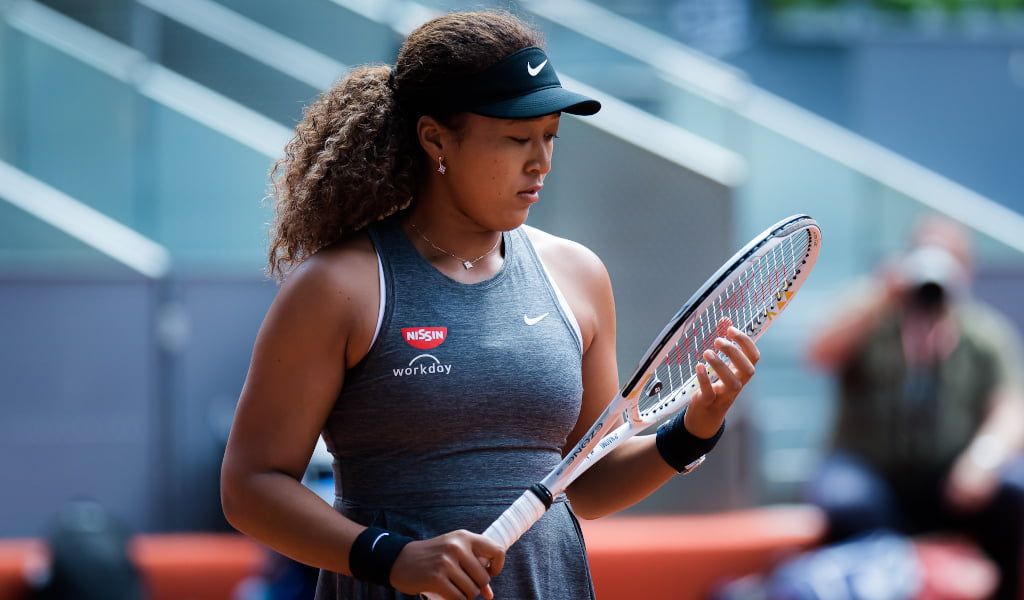The 23 year-old Japanese tennis player Naomi Osaka is a four time Grand Slam Champion and ranks World No. 2 in Women’s Tennis. Osaka was all set to participate in this year’s French Open Tennis Tournament and had won her first-round match over Patricia Maria Tig of Romania, following which she was required to attend a press conference. She skipped the conference citing that at this point, the press triggers her anxiety and that she feels people have no regard for the mental health of athletes.
The heads of the organisations in charge of all four Grand Slam tournaments said Osaka violated her contractual obligations when she announced that she wouldn’t speak with the media. In a joint statement, they warned that Osaka could face suspension from future tournaments for violating the code of conduct if she continues to refuse to address the media, and imposed a fine of 15,000 dollars on her. The resultant difference of opinion between both parties and the diversion of media attention from the sport to Osaka’s conduct led to her withdrawal from the French Open.
Osaka has never shied away from acknowledging her social anxiety. But it is extremely important to not limit her to the conversation about her mental health. She has actively responded to relevant social issues all along. Recently, she wore seven masks with the names of seven victims of Black racial injustice to the US Open in solidarity with the Black Lives Matter movement. She also sought an apology from a popular noodle brand who whitewashed her skin in their advertisement.
She has objected to the counter-productive rules and regulations of tournaments earlier as well. However, this time when she was asked to comply with the mandatory press conferences, she made a very important decision – she chose to place her mental health on priority. Osaka recounts in her Tweet, “The truth is that I have suffered long bouts of depression since the U.S. Open in 2018.” She mentioned that this “do press or you are going to be fined” attitude of the authorities is laughable, considering that the athletes are the foundation of the sport and the organisation. Her decision to quit the tournament has brought to focus the absolute necessity of addressing mental health in professional spaces like sports that remain shut to human vulnerabilities.
Osaka’s withdrawal: A step towards humanising the sports industry
Mental health is a taboo even today, because of social stigmatisation and the lack of awareness. Mental health conversations are often brushed under the carpet in professional spaces, especially in competitive industries like sports. The very fact that Naomi’s prioritisation of her mental health over the tournament came as a shock to so many people is appalling, and telling of the ways in which we have collectively internalised mental health to be the least of our priorities.
her decision to quit the tournament is also about creating boundaries, incorporating mental health sensitivity to work space regulations and humanising sports as an industry. This is particularly important now, in the pandemic era, when mental health has attained paramount priority
The Grand Slam Tournaments place media engagement as a core contractual responsibility of the athletes. They specify that it is the responsibility of the players to engage with the media, whatever the result of their match, a responsibility which players take for the benefit of the sport, the fans and for themselves. Osaka stood up for herself against the detrimental policies of the tournaments and shed light on the brutal terms and conditions international athletes are compelled to work with. Osaka’s stand is daring because it pushes for a dialogue about mental health among the sports community and breaks the myth of athletes being immune to vulnerabilities.
Though there have been previous sportspersons who have shared their journey with mental health like Michael Phelps and Serena Williams, what makes this move an extraordinary one is Osaka’s courage to choose mental health over popularly accepted notions of success as an individual. Osaka, like many before her, is trying to actively push for relaxed sanctions and ensure that safe spaces are available to future generations of athletes and sportspersons.
Acknowledging that media interactions do come within the professional package of being a tennis player, and that they help in image-building and publicity of the tournaments and players, Osaka has nevertheless been clear about their detrimental impact on mental health. Her decision to quit the tournament is also about creating boundaries, incorporating mental health sensitivity to work space regulations and humanising sports as an industry. This is particularly important now, in the pandemic era, when mental health has attained paramount priority.
Also read: Everyday Is Mental Health Day—Notes From My Life Journal
Solidarity from other athletes: Enabling mental health sensitivity
Ever since Naomi tweeted about her decision to disengage with the press and eventually quit the tournament, there have been mixed reactions to the news. Serena Williams came in support of Osaka’s decision to not put herself through the emotional roller coaster of media interviews. Williams stated, “You just have to let her handle it the way she wants to. I think she is doing the best she can.”
Nancy Hogshead-Makar (three time Olympic gold medalist in swimming) also championed Osaka’s decision. In a statement to the Washington Post she said, “It was obvious Naomi Osaka didn’t like news conferences, but few appreciated that she is just 23 and that she found them torturous. She was expected to deliver substantive responses that many tenured professors would have struggled to provide. It is embarrassing that we are only now recognising the humanity of our athletes.”
Many prominent psychologists have also backed Osaka’s decision to take care of herself. They attest that this has sparked a conversation about mental health among the exclusive tennis fraternity. Katherine Tamminen, Associate Professor of Sports Psychology at the University of Toronto said, “To me, this looked like a woman who was setting a boundary and saying I’m not going to put myself in those situations where I’m likely to experience increased risk of harm for my mental health.”
Questioning the normalisation of abusive work culture
Ever since we’ve made the switch to digital workspaces, we are almost controlled by our laptops and other electronic devices. We rarely invest time in ourselves and are forced to push work-life boundaries especially in the context of the pandemic ‘work from home‘ situation. This often results in complete burnout—emotional, physical and mental, because people don’t have the luxury to quit. Thus, it becomes crucial to look at conditions that force employees to adhere to this sort of toxic work culture that glorifies over working. Osaka’s decision to quit holds a mirror to re-assess and re-think our work environments.
Osaka’s choice is a compelling incident that pushes us to question the normalisation of abusive work culture and to listen to our bodies and minds. She underlines that there is no shame in asking for help when help is needed and that it is essential to fiercely guard our boundaries
Similarly, most often, we are trained to be positive about things in life. As essential as it is, it also leads to the suppression of how we actually feel deep within. Since we are told to only focus on the bright side of our respective lives and careers, more often than not we suffer from undiagnosed depression, anxiety or other mental health struggles which require professional assistance. Our reluctance to ask for help when it comes to mental health in contrast to physical aliments is testimony to the kind of stigma we all have been conditioned to have about it.
Osaka’s choice is a compelling incident that pushes us to question the normalisation of abusive work culture and to listen to our bodies and minds. She underlines that there is no shame in asking for help when help is needed and that it is essential to fiercely guard our boundaries.
Also read: Conversations With A Therapist On Mental Health During Lockdown
Every professional is only human, and personal success without mental well being is of no value. This is something we all need to understand and incorporate in our professional and private lives as individuals and a society.
Featured Image Source: Tennis365
About the author(s)
Srishti is a first year Masters student in Gender Studies at AUD. She is passionate about reading and chasing after dogs. You will often find her recommending ASMR videos to people.




